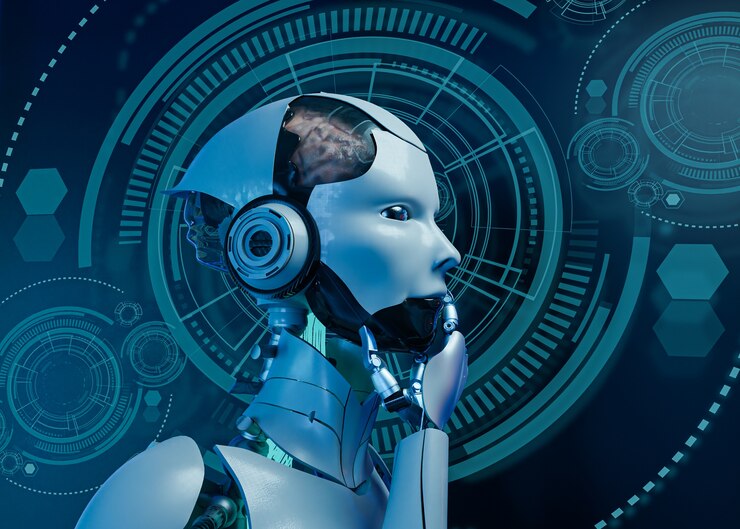The AI Revolution
Artificial intelligence (AI) is shaping the world in unimaginable ways, revolutionizing industries and significantly influencing our daily lives. In this article, we will explore six astonishing statistics that highlight the transformative impact of AI in various spheres of society.
1. Exponential Growth in AI Investment:
In recent years, investment in AI projects has grown exponentially. Statistics reveal that, to date, the global value allocated to AI initiatives has surpassed the impressive mark of 50 billion dollars. This substantial increase reflects the growing confidence in AI’s ability to drive innovations and improve efficiencies across various sectors.
2. Automation in the World of Work:
Automation, driven by artificial intelligence, is reshaping the global employment landscape. Around 30% of tasks in about 60% of occupations can already be automated. This raises crucial questions about workforce requalification and the need to adapt to the radical changes that AI brings.
3. Rise of Virtual Assistants:
AI-based virtual assistants like Siri, Alexa, and Google Assistant are becoming ubiquitous in our lives. Currently, over 3.25 billion devices use some form of virtual assistant. This impressive number underscores the rapid acceptance and integration of these technologies into people’s daily lives worldwide.
4. Enhanced Medical Diagnosis:
Artificial intelligence is revolutionizing the field of medicine, significantly improving the diagnosis and treatment of various health conditions. Statistics indicate that AI algorithms have a diagnostic accuracy of over 90% in areas such as radiology and pathology. These advances have the potential to save lives and radically transform healthcare delivery.
5. Pervasive Adoption in Financial Sectors:
Financial sectors are increasingly adopting AI-based solutions to optimize processes, predict market trends, and enhance security. Statistics indicate that over 75% of major banks use or plan to implement AI technologies in their operations. This rapid adoption highlights the perceived importance of AI in improving efficiency and decision-making in the financial sector.

6. Growing Contribution to Global GDP:
Artificial intelligence is becoming a significant driving force in the global economy. Studies show that by 2030, AI can contribute around 15.7 trillion dollars to the global Gross Domestic Product (GDP). This massive contribution underscores the fundamental role of AI in driving economic growth and transforming business models worldwide.
7. Ethical Considerations and Bias in AI:
One notable challenge in the AI landscape is the issue of bias. AI systems, trained on historical data, may inadvertently perpetuate existing societal biases. Acknowledging and rectifying these biases is vital to guaranteeing just and impartial AI applications. The industry is increasingly focusing on developing frameworks and guidelines to mitigate bias and promote ethical AI practices.
8. Privacy Concerns in the Age of AI:
The collection and utilization of vast amounts of data for AI applications raise significant privacy concerns. As AI systems become more sophisticated, safeguarding personal information becomes paramount. Legislation and regulations are evolving to strike a balance between fostering innovation and protecting individuals’ privacy rights.
9. Reskilling and Upskilling for the Workforce:
While AI brings about automation and efficiency, it also prompts the need for reskilling and upskilling the workforce. Individuals and organizations must invest in continuous learning to adapt to the evolving job market. Governments and educational institutions play a vital role in facilitating programs that equip individuals with the skills needed in the AI-driven future.
10. Collaboration and Global Governance:
The global nature of AI requires collaborative efforts and international governance to address challenges collectively. Establishing ethical standards, sharing best practices, and fostering collaboration between governments, industries, and academia are essential steps in ensuring responsible AI development and deployment.

11. AI in Climate Change Mitigation:
AI presents a unique opportunity to address global challenges, including climate change. By analyzing vast datasets, AI can contribute to more effective climate modeling, resource management, and sustainable practices. Leveraging AI for environmental conservation aligns with the broader goal of using technology for the betterment of humanity and the planet.
12. The Role of Education in AI Literacy:
Promoting AI literacy is crucial in preparing individuals for the AI-driven future. Educational institutions need to integrate AI education into curricula, ensuring that students develop a fundamental understanding of AI principles, its potential, and its societal impact. This proactive approach can empower future generations to harness the benefits of AI responsibly.
As we navigate the complex landscape of artificial intelligence, it is evident that the revolution extends beyond statistics. While the transformative power of AI is undeniable, addressing ethical considerations, ensuring privacy, and fostering a skilled workforce are integral aspects of responsible AI adoption. Collaborative efforts on a global scale are essential to harness the potential of AI for the benefit of humanity, ushering in a future where innovation aligns seamlessly with ethical considerations and societal well-being. As we continue on this journey, staying vigilant, adaptive, and collaborative will be key to maximizing the positive impact of AI on our world.
Did you like this topic? See more content about: AI & Machine Learning
SOURCE: tech.co





